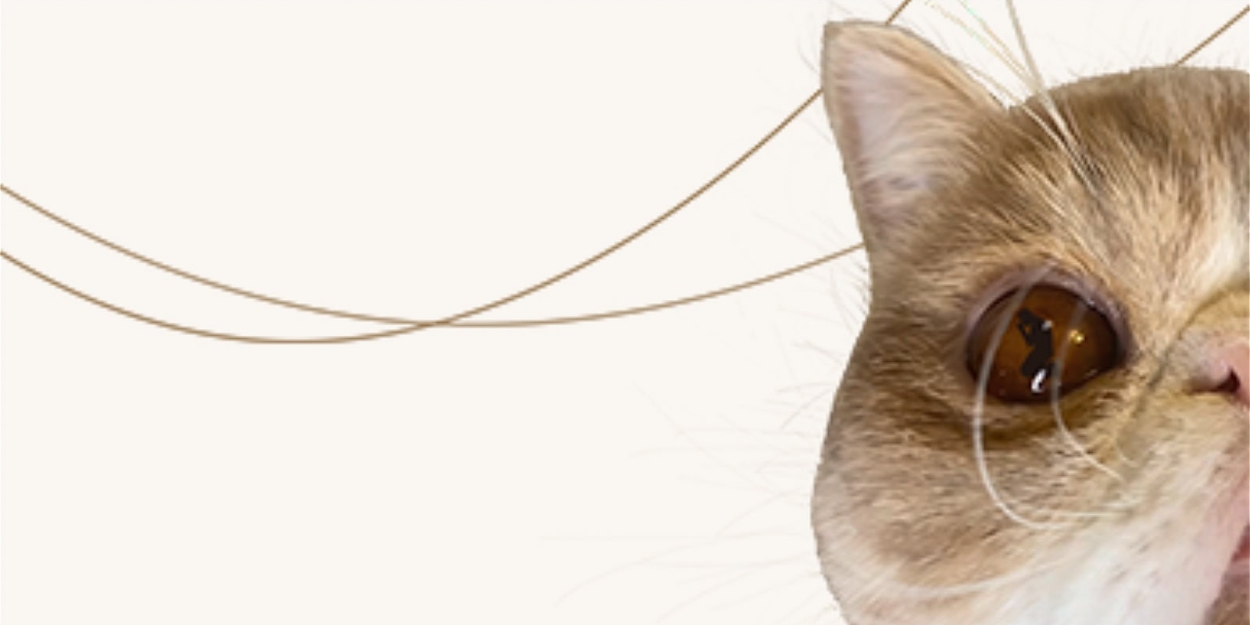Review: MY CAT NAMED LUCY at Capital Fringe Festival
Peyton Smetana's solo show explores mental and emotional health with the help of his adorable cat, Lucy

I don’t think anyone will object when I become hyperbolic to say that we, as humans, love our pets. For most people, their cat or dog (or reptile or goldfish or whatever) becomes part of the family once a human assumes the role of pet owner. For Charlie, the character at the center of the solo show and 2024 Capital Fringe Festival entry, MY CAT NAMED LUCY, his cat is a channel through which he interprets and attempts to understand the world. Lucy, Charlie’s Persian cat, therefore becomes the show’s central metaphor for the many obstacles and challenges Charlie faces as a young adult male functioning in the world.
Lucy is a fictitious amalgamation of a cat based on the playwright’s (Peyton Smetana, who also stars as Charlie) real-life two cats - Julius Caeaser and Beef Wellington. For my like-minded cat lovers out there, you’ll be happy to know both are adorably featured in a photo in the show’s program.
Lucy, like Charlie, has her own unique challenges. Chiefly, the cat struggles to breathe thanks to the breed’s signature flat face and genetic challenges associated with brachycephalic airway syndrome. Despite these physical challenges and resulting sympathy for the cat, the talk of Lucy is a welcome break from the heaviness of the show and as Charlie states at one point, “She’s the only living thing that can’t leave me.” Heavy - but is it made more tolerable and endearing because we’re talking about a cat?
Charlie muses if Lucy just pretends to have actual affection for him to survive and have her needs met ala Charlie Brown with Snoopy. He further postulates that Lucy would leave him if she could. Both are probably true (don’t take it personal, Charlie), but the point is Lucy makes for a sort of softening of the heavy topics. She makes it all seem not-so-scary and lightens the mood for the audience, which is desperately needed in a play that can be a bit of an emotional slog despite the piece’s brevity.
The play starts with a fairly sparse stage and set. We see a couch or loveseat of some sort, a mostly empty playing space, and a sign on an artist’s easel with the words “Charlie’s Therapy Notebook” written on it. Using the cat as an entry point, Charlie takes the audience on a play-disguised-as-a-therapy-session, emotional roller coaster through his mind and his life challenges. It’s a 50-minute monologue where Charlie is the patient and we, the audience, are essentially his mute therapist. Much like a therapy session, the thoughts are streaming and often not coherent. Very little is linear and topics switch at random.
We’re up close and personal (and arguably too much so in some of the play’s more uncomfortable moments) with Charlie as we see him work through his feelings of loneliness, his mammoth issues around perfectionism, and the persistent feeling that he’s disappointing somebody - although we’re never clearly told who he is disappointing or why this dominates his thoughts to begin with. We only hear recorded voices mimicking what we assume are his inner thoughts and the damaging things he tells himself over and over again.
It’s here where we stumble upon what could be considered the show’s most central flaw. We’re dropped into a very intimate “spilling of the guts” with Charlie without much context. We don’t have much time to get to know Charlie the person as a likable and sympathetic human before the problems and neurosis flow out of the actor’s mouth. Despite wanting an opportunity, the audience doesn’t have a chance to build much empathy for the character. The intensity ratchets up so quickly that it’s a struggle to orient yourself before you’re witnessing a person’s emotional and mental breakdown. It’s comparable to a roller coaster that takes you from 0 to 70mph without the safety of a lap bar or harness.
Additionally, whether it’s the lack of appropriate sexual education Charlie received as an adolescent or his struggle to accept his manipulative behavior in the past, the show stays in pretty heavy territory from start to finish. In particular, Charlie spends the most time reckoning with the struggle that he isn’t or has never been enough.
But much like his other obstacles, we never really dive deeper into the “why” behind these feelings. While Charlie presents struggles we’ve all dealt with at some point, there’s far too much space given to the feelings themselves rather than the context behind them, which means the audience never fully understands what he’s going through. That’s unfortunately the common thread here, and it does leave the piece in neutral as opposed to the powerfully moving piece it could be.
The other major challenge is we’re lacking a central conflict. Charlie’s litany of mental and emotional issues are presented, but there’s no action around them other than the naming of the issues themselves. Charlie doesn’t really work through anything in the piece. There’s no build-up to a climax, no peak, nor a resolution either. Once the lights come up at the end of the play, what should be a rush of emotion is instead replaced by confusion.
Arguably, at the core of the Capital Fringe Festival is giving space to theatre that wouldn’t otherwise have a platform. This means we, as the theatregoing public, are fortunate enough to witness a great variety of offerings in a myriad of stages of development. It’s quite clear that MY CAT NAMED LUCY is in an earlier stage. While there are certainly worthy topics in the show, particularly around the growth of mental health struggles in our society that emerged during and after the pandemic, Smetana’s work comes across as a bit self-indulgent and doesn’t take care of its audience enough to be effective.
MY CAT NAMED LUCY is written and performed by Peyton Smetana. The play was directed and produced by Emily Beloate. Additional voice-over recordings are provided by Jouney Donovan, Emily Gjovik, Dillon King, and Dane Larson.
MY CAT NAMED LUCY is a one-act, solo performance that runs approximately 50 minutes with no intermission. Audiences will need to check in at the Fringe box office at 1150 Connecticut Ave NW before making their way to Bliss Stage, where the show is being performed.
The show closed this past Sunday, July 21st as part of the 2024 Capital Fringe Festival but other festival offerings can be viewed at the festival website.
Comments
Videos
